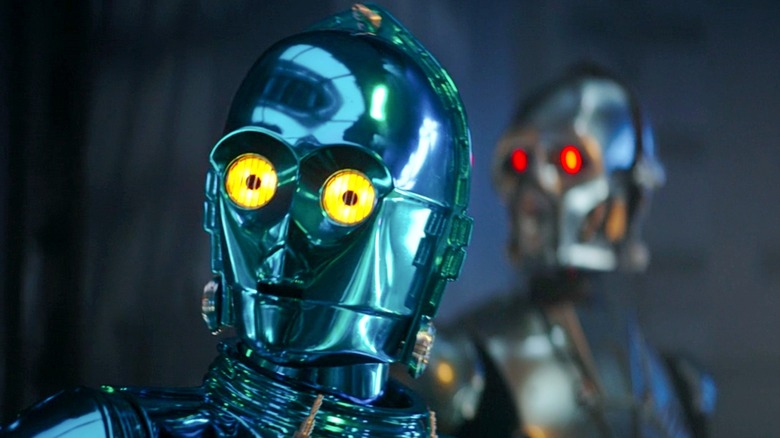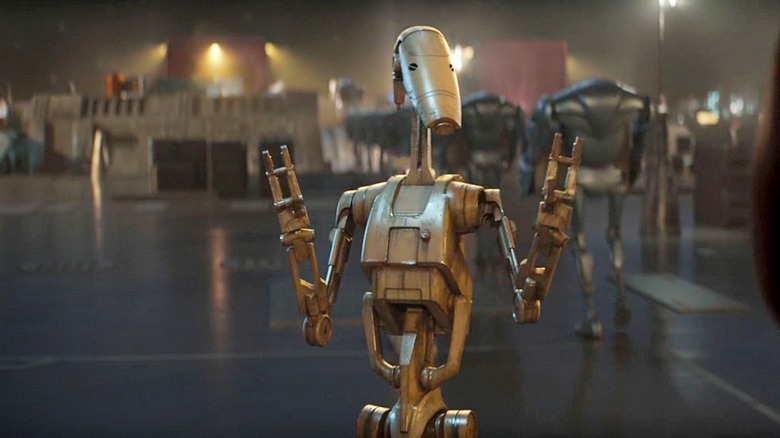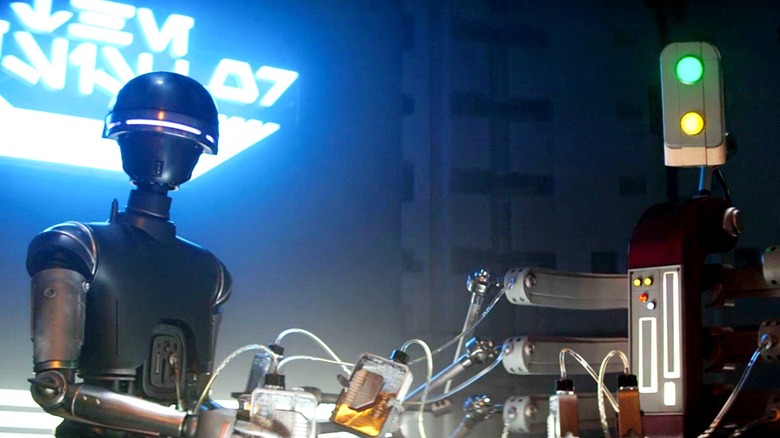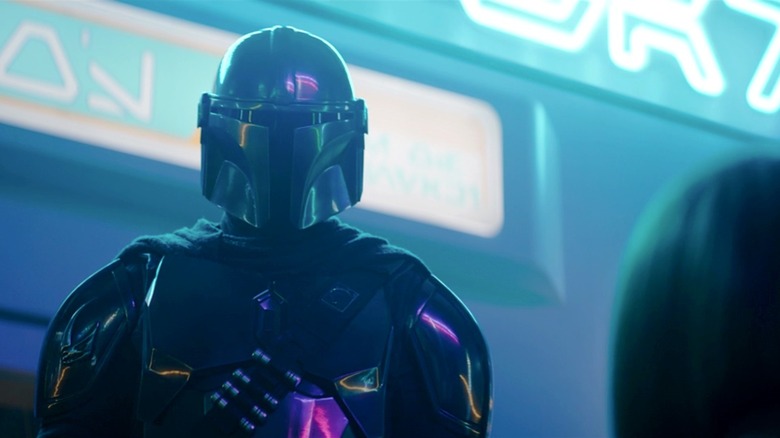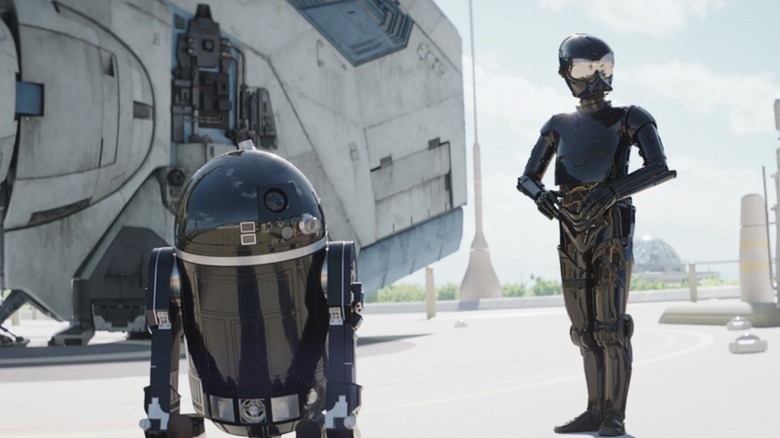The Mandalorian Goes All Blade Runner On Droid Labor In The Star Wars Universe
This post contains spoilers for "The Mandalorian" season 3, episode 6, "Guns for Hire."
Droids took center stage on the latest episode of "The Mandalorian," at least in terms of the morality and science fiction presented on the show. Oftentimes, "Star Wars" has skirted around the issue of droid rights and the morality involved in using droids for labor, but this installment of "The Mandalorian" took it on as the undercurrent for the episode. Naturally, it borrowed from the work of Philip K. Dick, featuring touchstones from "Blade Runner" throughout the episode.
Titled "Guns for Hire," the episode sees Din Djarin and Lady Bo-Katan Kryze tasked by the elected rulers of Plazir-15 with investigating an odd rash of droid malfunctions plaguing their planet. They live in a veritable utopia where the droids handle all of the labor, leaving the organic beings to lives of art and leisure. What's causing these violent malfunctions and what can be done to stop it? And what is the moral cost of a society that leans so heavily on droids?
The episode leans in just enough to raise the questions without truly answering them, but it gives us plenty to chew on.
Droid labor
The society on Plazir-15 is predicated on the idea that the droids do the labor and organics enjoy the fruits of it. This leaves the organic sentients to pursue things like art and leisure, while the droids keep society functioning. There's a haunting moment in "The Resistor" — the droid bar featured in the episode — where the bartender talks about wanting to help solve the crime. The droid labor is afraid that if the malfunctions don't cease, they'll be replaced. This existential crisis from a droid feels so fragile and pure. Are they simply programmed with this? Or do they have sentience and emotions in a way that makes the exploitation of their labor feel questionable? Are they programmed to enjoy the labor and feel useful? Or is this a larger commentary on the idea that organic lifeforms are created to make art and that should be their objective and droids are created for labor, and that's the work that they want to do?
The author Kurt Vonnegut, Jr. once said that "The arts are not a way to make a living. They are a very human way of making life more bearable. Practicing an art, no matter how well or badly, is a way to make your soul grow, for heaven's sake."
It seems that's exactly what the organics of Plazir-15 have found. But is that fair at the expense of the reconditioned droids?
Then again, it's worth wondering about the nature of the droids. Many of the droids we saw doing the labor were Battle Droids, reprogrammed for labor rather than war. Is that a leisurely step up in their contentment the same way art and leisure is a step up from labor for organics?
Next, we might get droids as artists.
Nepenthé
One of the more chilling literary allusions in this episode of "The Mandalorian" comes in the form of a reference to Homer's "The Odyssey." The droids come to the bar to drink nepenthé, which is described as a lubricant for their systems that "protects against mechanical wear while delivering program-refreshing subparticles."
But in the "Odyssey," nepenthe is actually a drug employed to forget grief and sorrows.
Is that what these droids are doing? Drinking in new programming to forget the sorrows they suffer from? Do these subparticles make them more docile? Or remove their inclination to live?
There's a vibe in the bar that the droids are like average blue-collar workers at a dive bar after the shift, drinking their worries away. The literary reference can't be ignored or discounted, it's written large for all to see, right in the text of the show.
Blade Runner
The episode also references "Blade Runner" quite a bit, both the moral quandaries presented in Philip K. Dick's book and the imagery of Ridley Scott's masterful adaptation. There are shots of the great domed city that look like they aimed to match that neon vibe right out of the film.
In this case, Din Djarin and Bo-Katan Kryze are cast as the Blade Runners tasked with deactivating the droids who are there to do the labor organics don't want to. In "Blade Runner," this is referred to as retiring them. There are added levels of moral complication in "Blade Runner" because the replicants are actually biologically grown and largely indistinguishable from humans. But the moral point remains the same: What is going on with these droids and is killing them a just sentence for their malfunctions?
As Bo-Katan and Din Djarin investigate further in sequences that feel equal parts "CSI" and "Blade Runner," they discover that the nepenthé the droids imbibed included nanobots that corrupted their programming. This once again ties into the themes of "Blade Runner" when you consider Harrison Ford's Deckard was a replicant himself, retiring others (assuming you're of the mind Deckard's secretly a replicant); here you have droids going in and corrupting the programming of other droids in an effort to get them all shut down.
Fortunately, Bo-Katan and Din Djarin were able to solve the issue and allow the droids to continue the existence they claimed they wanted by removing the rogue element. Still, it raises many questions.
The emotional intelligence of droids
As philosophers today debate the underlying questions about our moral obligation to droids, one of those chief considerations is emotional intelligence. Can a being experience pleasure or pain? Can a droid feel that you're being polite to it?
On the show "Obi-Wan Kenobi," it seemed as though Princess Leia certainly felt like droids were worthy of this respect, chiding her cousin for mistreating a droid. You can see a generational change in the way people treat droids across the "Star Wars" saga as well. In the prequels, droids are mindless enemies to be destroyed, tools of the Separatists. In the classic trilogy, some treat the droids with utter disrespect (like Han Solo) and others treat them as practically human (like Luke Skywalker.) By the time you get to the sequel trilogy in the timeline, Poe Dameron and Rey Skywalker both treat BB-8 as though he's a fully actualized and realized person, with wants and agency all on his own.
Does the society on Plazir-15 show us a place where there is an ethical exploitation of this droid labor? Or is this simply more damage of capitalism? All of these droids seem to have some awareness and emotional intelligence, right? The bartender droid exhibits wants and fears, hopes and desires. It's beyond programming.
Current AI models lack consciousness, but at what point does consciousness start? Does that need for moral and ethical treatment of droids extend as soon as we develop an attachment to them through our own anthropomorphizing?
One of the things I love so much about great science fiction is that it can raise such fascinating questions. "Star Wars" is much more fantasy than science fiction, though, so when it does raise these issues, it's all the better for it.
"Star Wars: The Mandalorian" is streaming on Disney+. New episodes arrive on Wednesdays.
